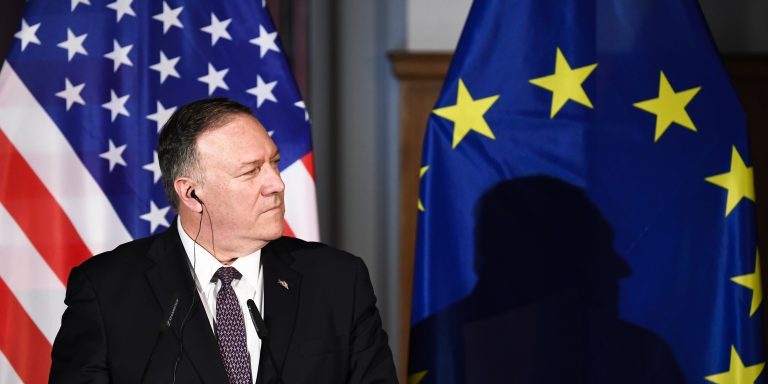INTELBRIEF
June 16, 2020
IntelBrief: U.S. Rift with Partners on Iran

- U.S. differences with its European allies, and with Russia and China, are widening over the Trump administration’s threats to scuttle the 2015 Iran nuclear deal.
- The dissolution of the agreement will cause Iran to advance its nuclear capabilities with little international oversight.
- Even if Washington succeeds in re-imposing all U.N. sanctions on Tehran, Moscow and Beijing are likely to proceed with new arms sales to the Islamic Republic.
- U.S. allies in Europe are unlikely to re-impose EU sanctions on Iran or join the U.S. campaign of maximum pressure.
A diplomatic battle is escalating between the Trump administration and traditional U.S. adversaries like Russia and China, but also between Washington and the United States’ longstanding allies in Europe. The dispute began in 2018 with the Trump administration’s abrogation of the 2015 multilateral Iran nuclear deal, originally agreed to by Russia, China, France, the United Kingdom, and Germany, as well as Iran and the United States. The European parties, in addition to Russia and China, viewed the agreement as a major advance for international security and the Trump administration’s withdrawal as a violation of U.N. Security Council Resolution 2231 that enshrined the agreement in international law. Resolution 2231 also provided for a U.N. ban on arms transfers to and from Iran until October 18, 2020 and a non-binding call for Iran to refrain from developing nuclear-capable ballistic missiles until October 18, 2023.
As of June, the Trump administration is insisting that, unless the Security Council approves a U.S. draft resolution extending the arms transfer ban indefinitely, the Administration will trigger a snap back of all U.N. sanctions – a move tantamount to ending the nuclear deal entirely. The Trump administration asserts that it legally remains a ‘participant’ in the nuclear deal, under a ‘plain reading’ of Resolution 2231, and has the right, under 2231, to unilaterally trigger a re-imposition of all U.N. sanctions. Russia and China, readying major new arms sales to Iran, have threatened to veto the U.S. arms ban extension draft not only on principle - insofar as an expiration of the arms ban was a major incentive for Iran to accept the accord - but also because of strategic self-interest. Not only Russia and China, but also France, Germany, and the UK, dispute the U.S. legal interpretation of Resolution 2231 and deny that the United States has the right to trigger a sanctions snap-back. On June 9, EU foreign policy director Josep Borrell directly rebuked the U.S. assertion that it has continuing legal rights under 2231, stating: ‘They withdraw. It's clear. They withdraw.’
If the Trump administration proceeds with a unilateral sanctions snap-back, the resulting divide among the permanent members of the Security Council might be irreconcilable. The positions of the other parties to the nuclear deal imply that any U.S.-triggered snap-back of sanctions, even if it succeeds formally, will not be viewed as legitimate and will not produce additional international pressure on Iran. Moscow and Beijing are almost certain to proceed with the arms sales to Tehran that they have been negotiating. The European countries are unlikely to re-impose the EU sanctions they had in place prior to the Iran nuclear deal, and their companies will continue to deal with Iran to the extent possible without harming their ability to also operate in the United States.
The latest U.S. threats add to already growing tensions over the Iran issue. In late May, Borrell attacked the ending of waivers of U.S. sanctions on companies that work in the permitted components of Iran’s nuclear program as ‘…mak[ing] it more difficult for the international community to ensure the exclusively peaceful nature of Iran’s nuclear programme.’ Borrell’s statement references the key concern among proliferation experts: that the result of U.S. policy will be an uncontrolled and unmonitored expansion of Iran’s nuclear program. Some forecast that Iran might even withdraw entirely from the Nuclear Non-Proliferation Treaty (NPT) and deny the International Atomic Energy Agency (IAEA) access to its nuclear facilities. It is entirely possible that Iran will react to a dissolution of the nuclear deal by enriching uranium to levels that would alarm the United States and other Iranian adversaries, such as Israel, bringing about fears of an Iranian sprint to develop a nuclear weapon. From that point, the distance to an all-out U.S. or Israeli strike on Iranian nuclear facilities, and a resulting all-out retaliation by Iran through its many proxies in the Middle East, is very short.
.
For tailored research and analysis, please contact: info@thesoufancenter.org